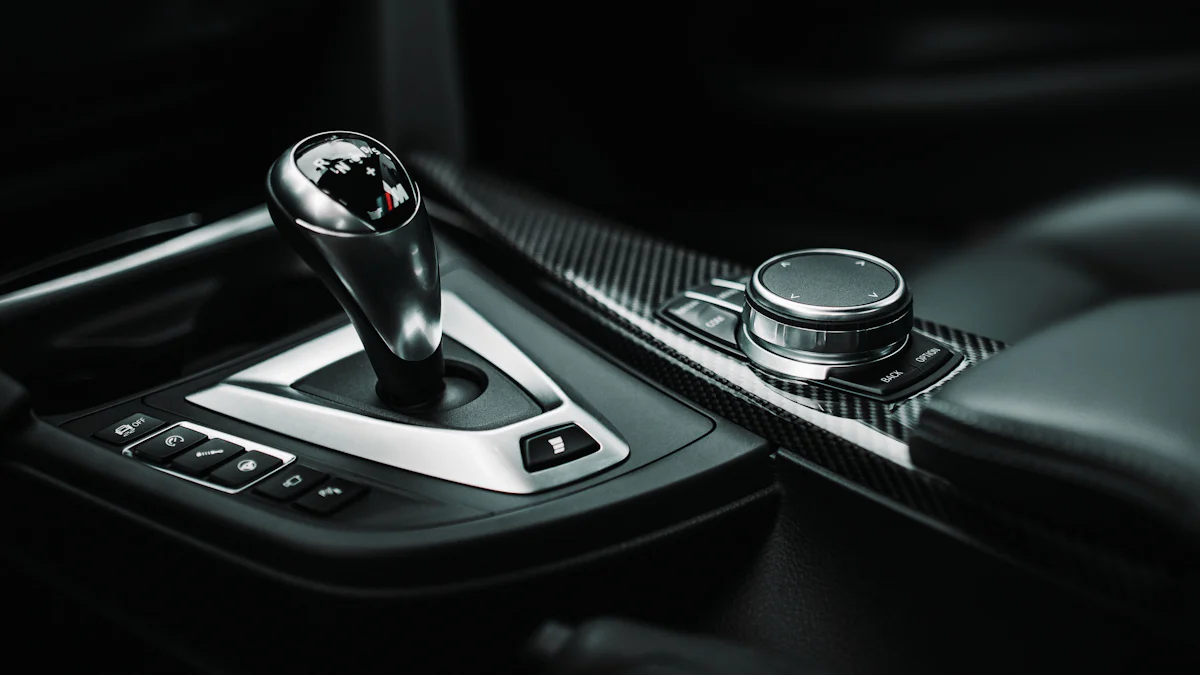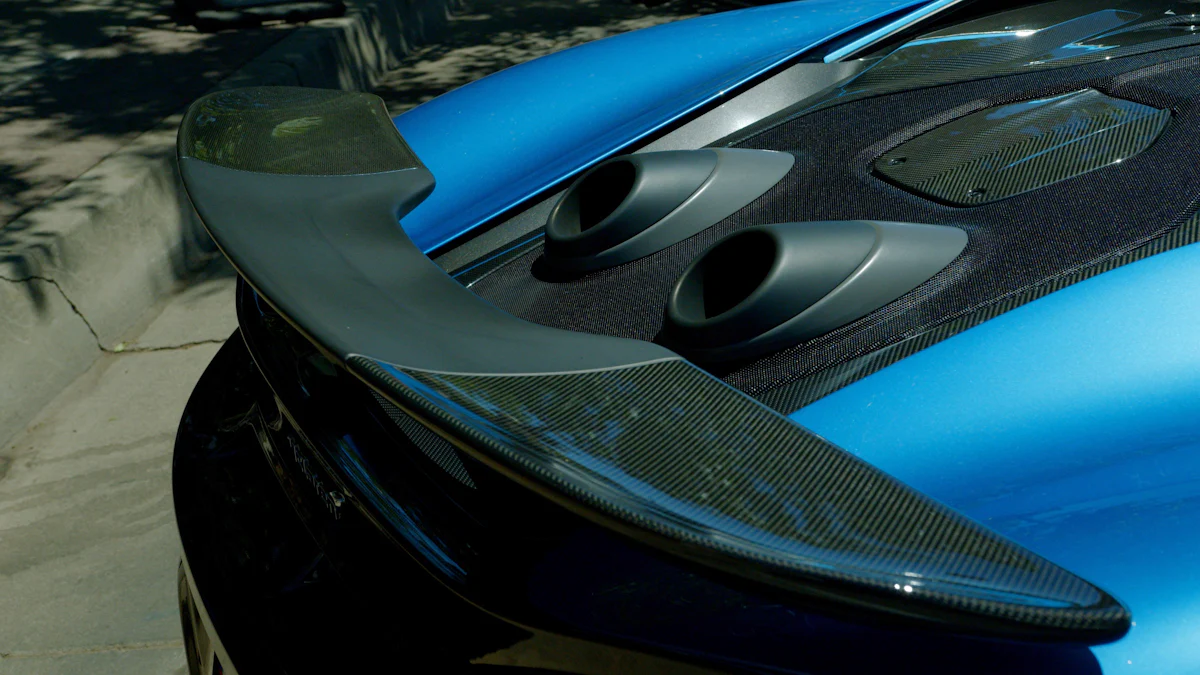Por qué la fibra de carbono supera a otros materiales en los coches de altas prestaciones

Carbon fiber has revolutionized the world of performance vehicles. Its unmatched combination of strength and lightweight properties makes it a game-changer for car parts. Pound for pound, carbon fiber is about five times stronger than steel while being up to 70% lighter. This incredible weight reduction enhances speed, handling, and efficiency without compromising durability. Whether you’re chasing faster acceleration or better fuel economy, carbon fiber delivers. If you’re asking, “are carbon fiber car parts worth the cost?” the answer lies in its ability to transform your driving experience with unparalleled performance and longevity.
Principales conclusiones
Carbon fiber is five times stronger than steel and up to 70% lighter, enhancing speed, handling, and fuel efficiency in performance cars.
Its exceptional strength-to-weight ratio allows for better acceleration and improved overall vehicle dynamics, making it a top choice for high-performance applications.
Durability is a key benefit; carbon fiber resists corrosion and environmental wear, reducing the need for frequent replacements and maintenance costs.
The aesthetic appeal of carbon fiber adds a modern, racing-inspired look to vehicles, allowing for customization that reflects personal style.
Investing in carbon fiber parts can significantly boost your vehicle’s resale value, as buyers recognize the performance and durability advantages.
While carbon fiber has a higher initial cost, its long-term value in performance enhancement and reduced upkeep makes it a worthwhile investment for car enthusiasts.
What Makes Carbon Fiber Unique?

The Composition and Properties of Carbon Fiber
Carbon fiber stands out due to its exceptional composition. It consists of thin strands of carbon atoms bonded together in a crystalline structure. This unique arrangement gives it remarkable properties, including high stiffness, tensile strength, and resistance to heat and chemicals. Unlike traditional materials, carbon fiber combines these qualities with an incredibly low weight, making it ideal for performance car parts.
The production process involves weaving these strands into a fabric and combining them with a resin to create a composite material. This method ensures that high-quality carbon fiber maintains its structural integrity under extreme conditions. Its low thermal expansion also means it retains its shape and performance, even when exposed to high temperatures. These characteristics make carbon fiber a superior choice for automotive applications where precision and reliability are critical.
Strength-to-Weight Ratio: The Key to Performance
One of the most compelling reasons to choose carbon fiber is its unmatched strength-to-weight ratio. Pound for pound, carbon fiber is significantly stronger than steel and aluminum while being much lighter. This advantage directly impacts a vehicle’s power-to-weight ratio, which is crucial for achieving better acceleration, handling, and fuel efficiency.
For performance cars, reducing weight without sacrificing strength is essential. Carbon fiber achieves this balance perfectly. Its lightweight nature allows manufacturers to design components that enhance speed and agility while maintaining the structural strength needed for safety and durability. This combination makes carbon fiber indispensable for high-performance vehicles.
Durability and Resistance to Environmental Factors
Durability is another area where carbon fiber excels. Its resistance to corrosion and environmental factors ensures long-lasting performance. Unlike steel, which can rust, or aluminum, which may weaken over time, carbon fiber remains unaffected by moisture and harsh weather conditions. This resilience reduces the need for frequent replacements, saving you time and money in the long run.
Additionally, carbon fiber exhibits excellent fatigue resistance. It can withstand repeated stress and loading without losing its structural integrity. This quality makes it ideal for car parts that endure constant pressure, such as suspension components and chassis elements. By choosing high-quality carbon fiber, you invest in a material that delivers consistent performance and reliability over time.
Advantages of Carbon Fiber for Performance Car Parts
Lightweight Design for Enhanced Speed and Efficiency
When it comes to performance car parts, weight reduction is a game-changer. Carbon fiber, as a lightweight material, offers unparalleled benefits in this area. By replacing heavier materials like steel or aluminum with carbon fiber, you can significantly reduce the overall weight of your vehicle. This reduction directly translates to faster acceleration, improved fuel efficiency, and better handling on the road or track.
The low weight of carbon fiber doesn’t compromise its strength. This unique combination allows manufacturers to design high-quality car parts that enhance both speed and efficiency. Whether it’s a hood, spoiler, or chassis component, carbon fiber ensures your car performs at its peak. If you’re aiming for a competitive edge, investing in carbon fiber parts is the smartest move you can make.
Exceptional Strength and Longevity
Durability is critical for performance car parts, and carbon fiber excels in this aspect. Despite its lightweight nature, carbon fiber boasts exceptional strength. It can withstand extreme forces and maintain its structural integrity under high stress. This makes it ideal for components like suspension systems and body panels, where strength is non-negotiable.
Carbon fiber also offers impressive longevity. Unlike traditional materials, it resists corrosion and environmental wear. Moisture, heat, and chemicals have little impact on its performance. This durability ensures that your investment in carbon fiber parts pays off over time. You won’t need frequent replacements, saving you money and ensuring your vehicle stays in top condition for years.
Atractivo estético y opciones de personalización
Performance isn’t just about speed and strength; it’s also about style. Carbon fiber parts bring a sleek, modern look to your vehicle. The glossy finish and unique weave pattern of carbon fiber add a racing-inspired aesthetic that turns heads. Whether you’re upgrading a sports car or a luxury vehicle, carbon fiber enhances its visual appeal.
Customization is another advantage. Carbon fiber can be molded into various shapes and designs, giving you endless options to personalize your car. From subtle accents to bold modifications, carbon fiber allows you to create a vehicle that reflects your style. Its combination of functionality and beauty makes it a favorite among car enthusiasts who value both performance and design.
Comparing Carbon Fiber to Other Materials
Carbon Fiber vs. Aluminum: Weight and Rigidity
When comparing carbon fiber to aluminum, the differences become clear. Carbon fiber is approximately 30% lighter than aluminum, giving it a significant edge in performance applications. This reduction in weight directly enhances acceleration, fuel efficiency, and overall handling. For performance cars, every pound matters, and carbon fiber ensures you get the most out of your vehicle.
Aluminum, while lightweight, lacks the rigidity that carbon fiber provides. Carbon fiber’s superior stiffness allows it to maintain structural integrity under extreme stress. This rigidity translates to better precision and stability during high-speed driving. If you’re looking for a material that combines lightness with unmatched strength, carbon fiber outshines aluminum in every way.
Carbon Fiber vs. Steel: Efficiency and Corrosion Resistance
Steel has long been a staple in automotive manufacturing, but it falls short when compared to carbon fiber. Carbon fiber is about five times stronger than steel while being up to 70% lighter. This strength-to-weight ratio makes it ideal for performance car parts, where reducing weight without compromising durability is crucial.
Steel also struggles with corrosion over time, especially in harsh environments. Carbon fiber, on the other hand, resists rust and environmental wear. It maintains its performance and appearance for years, making it a more efficient and long-lasting choice. By choosing carbon fiber over steel, you invest in a material that delivers superior performance and requires less maintenance.
Carbon Fiber vs. Other Composites: Cost-to-Performance Value
Other composites, such as fiberglass, offer some benefits, but they can’t match the cost-to-performance value of carbon fiber. While carbon fiber may have a higher initial cost, its unparalleled strength, durability, and lightweight properties make it a worthwhile investment. Fiberglass, for example, is heavier and less rigid, which limits its effectiveness in high-performance applications.
Carbon fiber’s ability to enhance speed, handling, and fuel efficiency justifies its price tag. It provides long-term value by reducing the need for frequent replacements and improving overall vehicle performance. If you prioritize quality and performance, carbon fiber stands out as the superior choice among composites.
How Carbon Fiber Enhances Vehicle Performance

Improved Aerodynamics for Better Speed and Fuel Efficiency
Carbon fiber transforms the way vehicles interact with air. Its lightweight nature allows manufacturers to design sleek, aerodynamic shapes that minimize drag. By reducing drag, your car can cut through the air more efficiently, leading to higher speeds and better fuel economy. A 10% reduction in a vehicle’s weight, often achieved with carbon fiber, can result in a 6-8% increase in fuel efficiency. This improvement not only saves you money at the pump but also enhances your driving experience.
The material also contributes to increased downforce, which keeps your car stable at high speeds. With better airflow management, carbon fiber parts like spoilers and diffusers ensure your vehicle stays grounded, even during high-speed driving. This combination of reduced drag and increased downforce delivers improved performance, making every drive smoother and more exhilarating.
Enhanced Handling and Stability for Precision Driving
Handling is critical for performance cars, and carbon fiber excels in this area. By significantly reducing the vehicle’s weight, carbon fiber lowers the center of gravity. A lower center of gravity improves stability, especially during sharp turns or sudden maneuvers. You’ll notice a more responsive and controlled driving experience, whether on the track or the road.
Carbon fiber’s stiffness also plays a key role in enhancing handling. Unlike traditional materials, it maintains its rigidity under stress, ensuring precise control during demanding conditions. This makes it ideal for components like suspension systems and chassis parts, where stability and precision are essential. With carbon fiber, you gain the confidence to push your car to its limits without compromising safety or control.
Increased Acceleration and Responsiveness
Acceleration defines the thrill of driving a performance car, and carbon fiber takes it to the next level. The material’s lightweight properties reduce the overall mass of your vehicle, allowing the engine to work more efficiently. This results in faster acceleration and a more responsive driving experience. Whether you’re merging onto a highway or racing on a track, you’ll feel the difference in how quickly your car reacts.
Carbon fiber also enhances acceleration and braking performance. By reducing weight, it minimizes the strain on your brakes, leading to shorter stopping distances and improved safety. The combination of quicker acceleration and more effective braking gives you unparalleled control over your vehicle. Every press of the pedal feels sharper, making your car more dynamic and engaging to drive.
Challenges of Using Carbon Fiber
High Production Costs and Limited Availability
Carbon fiber offers unmatched performance benefits, but its production comes at a high cost. The manufacturing process involves weaving carbon strands into fabric and combining them with resin to create a composite material. This intricate process requires advanced technology and skilled labor, which drives up the cost significantly. For car enthusiasts, this means that carbon fiber parts often come with a premium price tag.
Limited availability further complicates matters. Not all manufacturers have access to the resources or expertise needed to produce high-quality carbon fiber components. This scarcity can lead to longer wait times and higher prices for consumers. While the investment in carbon fiber pays off in terms of performance and durability, the upfront cost may deter some buyers. However, if you prioritize quality and long-term value, the benefits of carbon fiber outweigh the initial expense.
Repair and Maintenance Difficulties
Carbon fiber’s unique properties make it incredibly strong and lightweight, but repairing it poses challenges. Unlike traditional materials like steel or aluminum, carbon fiber cannot be easily welded or reshaped. Damage to carbon fiber parts often requires specialized tools and techniques, which can increase repair costs. For example, a cracked carbon fiber panel may need complete replacement rather than simple patchwork.
Additionally, finding skilled technicians to handle carbon fiber repairs can be difficult. Not every repair shop has the expertise to work with this advanced material. If you own a vehicle with carbon fiber components, you may need to seek out specialized service centers, which could be less convenient and more expensive. Despite these challenges, the durability of carbon fiber reduces the likelihood of frequent repairs, making it a reliable choice for long-term use.
Environmental Impact and Sustainability Concerns
The production of carbon fiber raises environmental concerns. The process consumes significant energy and generates waste, which impacts sustainability. For eco-conscious consumers, this can be a drawback when considering carbon fiber for their vehicles. While the material itself is durable and resistant to corrosion, its manufacturing process leaves a larger carbon footprint compared to traditional materials.
Recycling carbon fiber also presents challenges. Unlike metals, which can be melted down and reused, carbon fiber composites are harder to recycle. This limitation contributes to waste and raises questions about the material’s long-term environmental impact. However, ongoing research aims to develop more sustainable production methods and recycling solutions. By supporting manufacturers that prioritize eco-friendly practices, you can help drive innovation in this area.
Are Carbon Fiber Car Parts Worth the Cost?
Long-Term Value for Performance Enthusiasts
If you’re passionate about high-performance cars, investing in carbon fiber parts offers unmatched long-term value. These components deliver exceptional durability, ensuring they last for years without losing their effectiveness. Unlike traditional materials, carbon fiber resists wear and tear from environmental factors, saving you from frequent replacements. This reliability means you spend less on maintenance and repairs over time.
The lightweight nature of carbon fiber also enhances your driving experience. By reducing the overall weight of your vehicle, it improves speed, handling, and fuel efficiency. These benefits make every drive more thrilling and rewarding. When you consider the performance gains and reduced upkeep costs, the answer to “are carbon fiber car parts worth the cost?” becomes clear. For performance enthusiasts, the value far outweighs the initial expense.
Essential for High-Performance and Luxury Vehicles
Carbon fiber is not just a material; it’s a symbol of excellence in high-performance cars and luxury vehicles. Manufacturers of these cars rely on carbon fiber to achieve superior speed, precision, and aesthetics. Its lightweight properties allow engineers to push the boundaries of design and performance, creating vehicles that stand out on the road and track.
For a high-performing car, every detail matters. Carbon fiber components, such as spoilers, hoods, and chassis parts, enhance aerodynamics and stability. These improvements translate to better acceleration, sharper handling, and a smoother ride. If you own or aspire to own a high-performance or luxury car, carbon fiber parts are essential for unlocking its full potential. They elevate your vehicle’s capabilities while adding a touch of sophistication.
Resale Value and Prestige in the Automotive Market
When it’s time to sell your car, carbon fiber parts can significantly boost its resale value. Buyers recognize the advantages of carbon fiber, from its durability to its performance-enhancing qualities. Vehicles equipped with these parts often command higher prices in the market, making your investment worthwhile.
Beyond monetary value, carbon fiber adds prestige to your car. Its sleek appearance and association with high-performance cars make it a sought-after feature among automotive enthusiasts. Owning a vehicle with carbon fiber components signals your commitment to quality and performance. This reputation enhances your car’s appeal, ensuring it stands out in a competitive market. If you’re still wondering, “are carbon fiber car parts worth the cost?” the increased resale value and prestige provide a resounding yes.
Carbon fiber redefines performance car parts with its unmatched benefits in strength, durability, and weight reduction. You gain a material that enhances speed, handling, and aesthetics while delivering long-term value. Its durability ensures fewer replacements, saving you money over time. The premium cost pays off by boosting your vehicle’s resale value and prestige. For those who demand the best in performance and design, carbon fiber remains the ultimate choice. By investing in it, you elevate your driving experience and secure a material that outshines all others.
PREGUNTAS FRECUENTES
Why is carbon fiber the ultimate material for performance car parts?
Carbon fiber stands out as the ultimate material for performance car parts due to its exceptional combination of strength, lightweight properties, and durability. It enhances your car’s speed, handling, and fuel efficiency while maintaining structural integrity under extreme conditions. Additionally, its sleek appearance adds a modern, racing-inspired aesthetic to your vehicle. If you’re looking to elevate your car’s performance and style, carbon fiber is a smart investment.
Why is carbon fiber used in cars?
Manufacturers use carbon fiber in cars because of its unique ability to create lighter, stronger, and more aerodynamic vehicles. Its high strength-to-weight ratio makes it ideal for structural components like chassis, body panels, and suspension parts. This material allows cars to achieve better acceleration, improved handling, and enhanced fuel efficiency. By incorporating carbon fiber, automakers can deliver vehicles that outperform those made with traditional materials like steel or aluminum.
What are the advantages of carbon fiber car parts?
Carbon fiber car parts offer several advantages that make them highly sought after by car enthusiasts:
Diseño ligero: Carbon fiber is about 70% lighter than steel and 30% lighter than aluminum, leading to better acceleration and fuel efficiency.
Exceptional Strength: Despite its light weight, carbon fiber is incredibly strong and durable, making it perfect for high-stress components.
Atractivo estético: The glossy finish and unique weave pattern of carbon fiber add a premium, sporty look to your vehicle.
Improved Performance: Its lightweight nature enhances handling, braking, and overall driving dynamics.
These benefits make carbon fiber an ideal choice for upgrading your car’s performance and appearance.
How does carbon fiber improve a car’s aerodynamics?
Carbon fiber allows manufacturers to design sleek, aerodynamic shapes that reduce drag and increase downforce. By minimizing air resistance, your car can achieve higher speeds and better fuel efficiency. Carbon fiber parts like spoilers and diffusers also enhance stability during high-speed driving, ensuring a smoother and more controlled experience. This material transforms your vehicle into a more efficient and performance-driven machine.
Are carbon fiber car parts worth the cost?
Yes, carbon fiber car parts are worth the cost for those who value performance, durability, and style. While the initial investment may be higher, the long-term benefits outweigh the expense. Carbon fiber parts last longer, require less maintenance, and significantly enhance your car’s speed, handling, and fuel efficiency. Additionally, they boost your vehicle’s resale value and prestige, making them a worthwhile investment for performance enthusiasts.
Can carbon fiber car parts be repaired?
Repairing carbon fiber car parts can be challenging due to their unique composition. Unlike steel or aluminum, carbon fiber cannot be easily welded or reshaped. Damage often requires specialized tools and techniques, which may increase repair costs. However, the material’s durability reduces the likelihood of frequent repairs. Choosing high-quality carbon fiber parts ensures long-lasting performance and minimizes the need for maintenance.
¿Es ecológica la fibra de carbono?
The production of carbon fiber consumes significant energy and generates waste, raising concerns about its environmental impact. Recycling carbon fiber is also more complex compared to traditional materials like steel or aluminum. However, ongoing research aims to develop more sustainable manufacturing and recycling methods. By supporting eco-conscious manufacturers, you can help promote greener practices in the automotive industry.
What types of car parts are commonly made from carbon fiber?
Carbon fiber is used to create a wide range of car parts, including:
Body Panels: Hoods, roofs, and doors benefit from carbon fiber’s lightweight and durable properties.
Aerodynamic Components: Spoilers, diffusers, and splitters improve airflow and stability.
Structural Parts: Chassis and suspension components gain strength without adding unnecessary weight.
Características interiores: Dashboards, trim, and seats achieve a modern, high-performance look.
These applications showcase carbon fiber’s versatility and effectiveness in enhancing both performance and aesthetics.
How does carbon fiber compare to aluminum and steel?
Carbon fiber outperforms aluminum and steel in several key areas:
Peso: Carbon fiber is significantly lighter, improving acceleration and fuel efficiency.
Strength: It offers five times the strength of steel and greater rigidity than aluminum.
Resistencia a la corrosión: Unlike steel, carbon fiber resists rust and environmental wear.
Durabilidad: It maintains its structural integrity under extreme conditions, making it a more reliable choice.
For performance car parts, carbon fiber delivers unmatched advantages over traditional materials.
Can carbon fiber increase a car’s resale value?
Yes, carbon fiber parts can boost your car’s resale value. Buyers recognize the performance and aesthetic benefits of carbon fiber, making vehicles equipped with these parts more desirable. Additionally, carbon fiber’s durability ensures that your car maintains its condition over time, further enhancing its market appeal. Investing in carbon fiber not only improves your driving experience but also adds long-term value to your vehicle.
